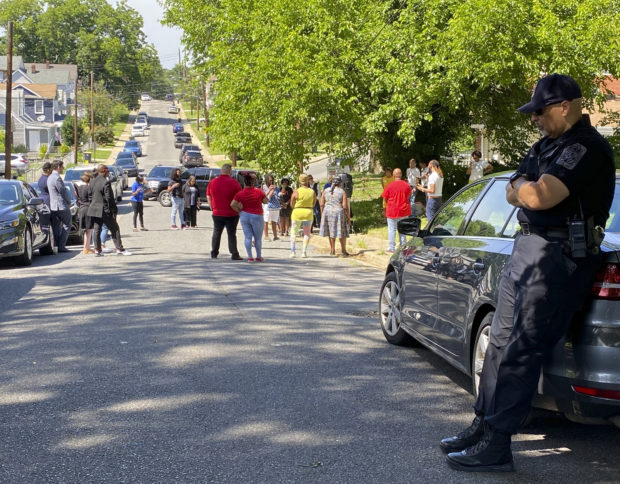In US capital area, Black transgender sex workers on edge

Lt. Earl Ivey(R), Fairmount Heights Police Department Commanding Officer watches after he sectioned off the street during a memorial service for two Black trans women sex workers slain in 2019, on June 25, 2021 in Fairmount Heights, Maryland. AFP
FAIRMOUNT HEIGHTS, United States — Even though it was two years ago, Iya Dammons remembers what she said to Ashanti Carmon just before the 27-year-old was shot dead.
That night, the two Black transgender sex workers were among several working the poor area between the US capital and Maryland.
“We were laughing and talking on the corner, and she was like, ‘Girl, I’ll be right back’,” Dammons, the founder and executive director of Baltimore Safe Haven, a housing and social services nonprofit helping transgender people, told AFP.
“And she got into a vehicle. It turned down a side street and I heard gunshots.”
Carmon and Zoe Spears, 23, were killed within the space of a few months — and within a few blocks of each other — while doing sex work along Eastern Avenue, which forms the border between Washington and the town of Fairmount Heights.
Article continues after this advertisementUnfortunately, their murders are part of a deadly trend affecting the wider transgender community.
Article continues after this advertisementThe Human Rights Campaign reported 44 transgender people killed in the United States in 2020, making it the deadliest year since the advocacy group began tracking keeping records in 2013. More than half of them were women of color.
Globally, 350 transgender people were killed in 2020, according to Transrespect versus Transphobia Worldwide, a research project coordinated by Transgender Europe.
Dammons was on her own from age 15 — she fled a substance-abusing mother, bullying at school and a grandmother who tried to “pray the trans away.”
“It starts in the nest,” she said.
‘Their lives matter’
In the United States, data from the National Center for Transgender Equality points to economic pressures making the transgender community particularly vulnerable to violence.
A 2015 survey of the community by the center revealed that 21 percent of the Black transgender population surveyed said they had participated in sex work for income — with Black trans women representing more 60 percent of that number.
One in four transgender people in the United States said they had lost a job due to workplace bias. And one in eight become involved in survival sex work or the drug trade due to extreme levels of unemployment and poverty.
Cassy Morris co-founded The LGBTQ Dignity Project following the killings of Carmon and Spears, who were honored at a recent memorial service in Fairmount Heights.
“We need to show them that their lives matter,” Morris told AFP. “And that there is a community behind them that supports them.”
‘Just want to be respected’
Karen Kendra Holmes, a Black transgender woman, was part of a special police ride-along program put in place shortly after the murders to help liaise with the women on the streets in the wee hours when they felt most vulnerable.
“During one week I was out there, there were a couple of shootings,” Holmes told AFP.
Holmes’ church bought her a bulletproof vest so she could continue trying to help get the girls off the street. The program however ended in 2020 due to the Covid-19 outbreak.
Thea Zumwalt, an assistant state’s attorney in Maryland’s Prince George’s County, said Spears had been known to work on a particular corner along the border that was not well lit. Last week’s memorial service was held there.
“It’s one of the reasons why this is a busy area for drugs and sex. It’s really dark here at night,” Zumwalt said.
“If it wasn’t for that camera, we might never have known what happened here.”
Gerardo Thomas, 33, was arrested in 2019 and recently convicted for Spears’ murder. Carmon’s killing remains unsolved.
Dammons — who says she still faces criticism for being “an angry Black trans woman” — says she is frustrated at having spent so much of her life struggling to survive, when she is so close to the US seat of power.
“I’m originally from DC, and it’s traumatizing to see that we’re right there near the nation’s capital,” she said. “Eastern Avenue is a place of trauma. I had to get away from that space to understand it all.”
But Holmes, also originally from Washington, said the capital is just another city in the throes of a crisis for the transgender community, especially Black women.
“Fairmount Heights is no different than any other area in the country or around the world,” Holmes said.
“We just want to be respected and treated the same as anyone else. What gives someone the right to call me names at a bus stop or kill me for being trans?”